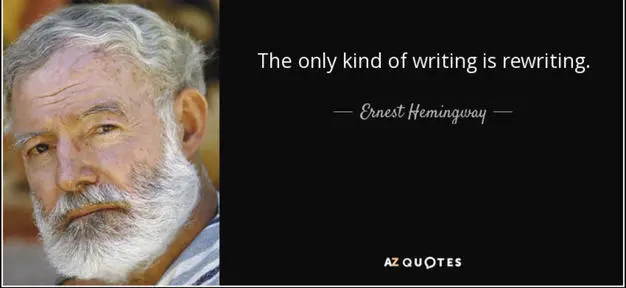How to Take Your Writing from Good to Great

There are so many skills that go into being a great writer: a strong and unique voice, an intuitive sense for pacing and sentence structure, a healthy knowledge of vocabulary, the ability to craft richly compelling characters, a vivid imagination and so many more. It would be easy to focus on these to the exclusion of what may be the most underrated and yet crucial writing skill: stamina.
Stay with me! I think you’ll see what I mean, why we all could use more of this skill and how to go about building this writing skill for yourself.
Writing is Rewriting

I’ve done my fair share of beta reading and far more than my share of reading for pleasure. I suspect that you probably have as well. Those of us who love to write do a lot of reading and we often do a lot of collaborating with other writers. I can tell you beyond a shadow of a doubt that the difference between a book that’s awkward and amateurish and one that feels traditionally published (regardless of whether or not it is) is due to rewriting.
Those skills we mentioned before matter. We need to be able to craft novel stories with characters that readers love. We have to have a good sense for foreshadowing, tension and pacing. However, if we don’t know how to rewrite, none of that will matter. The story won’t come together. Authors such as Hemingway, E.B. White, Truman Capote and Roald Dahl have all reiterated the fact that there’s no such thing as a well-written book without extensive rewriting.
How to go about that is a subject I’ve already addressed from my own methodology. Find it here! In that post I address the [huge] difference between editing and rewriting. I then explain my process for rewriting. If you’re interested, I highly recommend checking it out. I learned this process as I worked though my own writing journey. It isn’t the only way to go, but it has helped me immensely.
When you read it, what you’ll probably notice though is that it sounds exhausting…because it is! Hence the essential skill that we all need to build: stamina.
Start Small
One thing that I’ve experienced and have heard from other authors, especially earlier in their writing careers, is to start with writing short stories.
I wrote a lot of short stories when I was in school, but in more recent years I’ve moved onto novels. However, one thing that has helped me a lot is to still write short stories on the side. I sometimes do that through writing contests. They provide me with a great prompt and a deadline and often fall outside of my own genre. That makes for great practice. In the process, I’ve noticed that my writing skill has improved dramatically.
It might surprise you to know that Ray Bradbury, a man who was known as a pantser—one who wrote by the seat of his pants, without an outline, began by writing short stories. He had a method. He would come up with an idea on Sunday, would write the first draft on Monday and then would write drafts two through six each day from Tuesday through Saturday. When he finished the last draft on Saturday he’d submit it. He did that every week of the year. That’s a lot of stamina!
Novel Off-Shoots
Another practice that can be invaluable in building this writing skill is to practice writing off-shoots of your novel. These can be things such as: writing a side story about the character that helps you to get into her head and understand her motivations better; taking a scene out of the novel and reworking it as a stand-alone snapshot until it’s as refined and clean as it can be; or writing a character’s backstory as a separate short story [or flash fiction] so that you have a more developed understanding of this and can write the character more convincingly.
These suggestions are often useful for the reasons mentioned above, however they also develop our (re)writing ability. Think of short stories or novel off-shoots as sprints.
When I ran cross-country in high school, my coach would often require us to run sprints. As a distance runner, this seemed like a silly waste of time. I valued the twelve-mile runs that seemed to do the most to build the stamina that I needed. However, the sprints always surprised me. I came away much faster and able to finish stronger because of them.
Break Up the Work
Lastly, after you’ve written your first draft and you’re ready to pursue the rewriting process, refrain from editing for grammar, spelling and punctuation. Trust me, it’s not time for that. You’ll just end up either wasting your time or settling for a lower-quality finished product.
Instead, I recommend dividing the rewriting process into layers. I start with the most foundational and build up towards the surface. That means that I start by considering things such as: is the plot complete (no holes), are all of the scenes in the right place, are some missing, or unnecessary, or redundant? Then I might move onto character development and voice. I talk about all of this in great detail in the article that I referenced earlier. Find it here.
The point is not to tell you what rewriting method will work for you. Rather, this type of method can keep you from becoming daunted by the overwhelming number of things that go into a novel, all of which need to be addressed in the rewriting process. It can also help you to develop the writing skill of stamina by giving you a roadmap to work through from the bones of the story to the final edit. As you navigate the many rewrites necessary to produce a beautiful, polished novel, you’ll discover your own method.
Conclusion
At the end of the day, how you go about a rewrite is up to you, but you won’t do it well without a lot of stamina. None of us do. Writing is hard, but at the end of the process, the sense of accomplishment is huge! I love reading my own stories. After all, I took the advice I heard and wrote the stories that I wanted to read.
But more than that, I rewrote them over and over, paying attention to the smallest details. I built up my stamina and plan to continue to do so for the rest of my career. Because stamina is the difference between good and great!
If you enjoyed this post, share is with your friends!